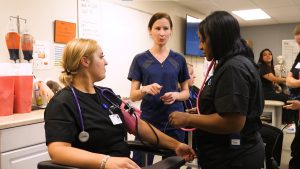On the Job Medical Assisting Skills
April 27, 2015
Four medical assisting skills you can learn on the job
On the job experience is important when it comes to a medical assisting career. You’ll learn a lot during medical assisting career training, but there are certain skills you won’t truly develop until you’re working.
If you are considering a career in medical assisting, or you are in a training program already, these traits are very important to develop on-the-job.
Patience with others
Whether you’re on the phone with a confused family member discussing medical billing procedures, checking in patients or making rounds and taking vital signs, medical facilities can be hectic. As an entry-level Medical Assistant, you’ll realize that not everything goes as smoothly as it should. You’ll quickly develop a level head to handle the potential madness.
Teamwork on the job
The job is hectic! The sooner you learn to form working relationships with your colleagues, the better. Teamwork is important and the more you work together and listen to each other’s opinion, all the better for your medical facility. Make it a priority to develop positive bonds with everyone around you.
Coping With Grief:
As a new Medical Assistant, you’ll encounter your fair share of difficult situations surrounding a patient’s health. It’s a fact of the medical profession. But when you hold proper Medical Assistant skills, you prepare for the unknown and sad times. More often than not, though, you’ll work with patients who are able to heal and grow healthier right before your eyes. Helping patients heal makes your job that much more rewarding!
Self-Confidence:
Patients want to know that the professionals in charge are confident in their ability to perform their jobs well. You’ll see that the more comfortable you are, the more trusting patients and coworkers will feel around you. By studying hard while a student, and learning everything possible about the medical assisting profession, you’ll develop the confidence needed to excel in your health care career.
Ideally, you’ll already have a decent handle of these skills when you enter a career in healthcare. But they say that practice makes perfect, and we’ve found this to be true. As good as you are at the beginning, your Medical Assistant skills will only get better as you spend time in the medical field. Start your journey toward a Medical Assisting career – request information today, and we’ll help you begin!
More on Medical Assisting:

